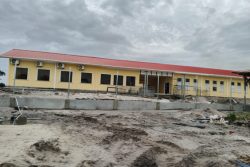While declaring several times that the APNU+AFC government will ensure that the sugar industry doesn’t sink, Prime Minister Moses Nagamootoo was yesterday unable to offer specific assurances to a National Cane Farmers Conference but urged the attendees to embrace the change imposed by falling market prices, rising costs and climate change.
The National Cane Farmers Conference at the Arthur Chung Conference Centre – the fulfilment of a manifesto promise by APNU+AFC – was graced by a number of Ministers, dignitaries and cane farmers.
Nagamootoo, who has had decades of association with sugar workers through his erstwhile party, the PPP, pledged the rejuvenation of the sugar industry, whose state he said had been reduced to a “pauper – a beggar that lives off handouts from the state.”
This, he said, was a far cry from the olden days of ‘King Sugar’ and he referenced the recent $4B bailout of the Guyana Sugar Corporation (GuySuCo) that the government was forced to extend days after entering office. He said that while in the past two years Parliament has authorised some $17B to be transferred to the corporation, whose “leadership brought the industry to its knees,” it still badly needs more. In this year’s budget, Finance Minister Winston Jordan had said that a total of $12B—inclusive of the earlier subvention—would be made available to GuySuCo.
Nagamootoo praised private cane farmers saying that their community, totalling 2,200 individuals, must be recognised for their sterling contributions to the overall sugar production drive of GuySuCo.
With families included, he said, over 10,000 persons have for many years dedicated their lives to growing sugar cane. These farmers, he added, are expected to produce 26,132 tonnes of sugar this year. They have already made 8,991 tonnes in the first crop and another 17,141 tonnes of sugar is expected for the second crop. This, he noted, will amount to approximately 11.5% of the total sugar output for this year. “You can rest assured as you leave here today that you will not be unemployed,” he boldly stated to cane farmers, though it was hardly comforting that in the same breath he noted that Jamaica had scaled back output and Barbados, Trinidad and Tobago and St Kitts had exited sugar. He further acknowledged that Guyana’s cost of production of sugar was high but that there was still hope that the “industry would improve and eventually succeed.”
Looking ahead, he said that new and improved varieties of cane are required to boost productivity at the field level along with “appropriate investments”. He added that the APNU+AFC government will consider making more land available to cane farmers and to stimulate cane farmers’ cooperatives. He also applauded GuySuCo for the lifeline it has provided to cane farmers through extension services.
“Difficult times are now with us, especially with the plummeting market prices and rising operating costs and climate changes. Farmers must embrace these changes,” Nagamootoo said. He called on the respective ministers with responsibilities for agriculture, finance, business and cooperatives to “enact appropriate legislation to protect and support private cane farming in Guyana, so that you, cane farmers, can provide for yourselves and your families through enhanced earnings from cane farming. Eventually, we hope that all cane farmers would have improved living conditions and a better way of life.”
Earlier in his address, he had pointed out that the Commission of Inquiry set up by the APNU+AFC government into the sugar industry is expected to come up with answers on the way forward. One key answer, he said, would be why the Skeldon sugar factory, on which $47B was expended, has failed.
“With the establishment of a Commission of Inquiry into the sugar industry, we are attempting to ensure that we create a flexible, integrated and environmentally-sensitive sugar sub-sector to satisfy the demands of domestic, regional and international competitive markets,” the PM said.
He said there were many problems besetting GuySuCo and he cited the shortage of skilled personnel, the labour turnout, GuySuCo’s Capital Expenditure Programme, the cost of production and the marketing of sugar and vowed that the government would seek to have these adequately addressed as a matter of urgency.
“The focus is to make sugar work. We have too many workers who stand to lose with the collapse of the industry,” he stated.
“It must be recognised that the industry does not produce sugar alone, byproducts can be produced at every stage,” Minister of Agriculture Noel Holder told the conference as he highlighted the various options for diversification in the sugar industry.
He suggested that packaging and storage of rice, ethanol production, aircraft services and aquaculture farming could assist in attracting investors. He added that the government is prepared to offer waivers to interested investors.
The conference was not just used as a stage to notify the cane farmers that the government will be behind them and the industry, some of the farmers were able to voice their concerns and ask questions.








